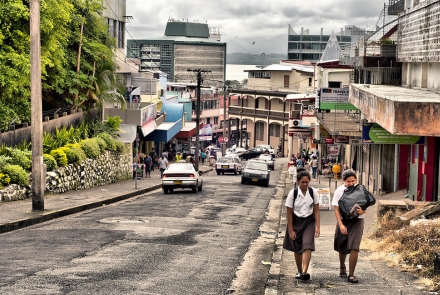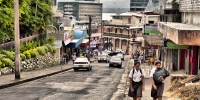
Photo by Kyle Post on Flikr
COVID-19 – the Pacific response: 29 April 2020
Positive test results for COVID-19 have reduced dramatically in the Pacific region this week, with figures showing a marked slowing in the virus’s confirmed spread.
Confirmed cases of COVID-19 in Papua New Guinea have increased to eight cases across four of the country’s provinces. This is up one from this time a week ago, with Western Province confirming its first case. Elsewhere in the region, Fiji reports 18 cases, with no new cases this week, the Republic of the Marshall Islands reports 8 cases, French Polynesia reports 57 cases, with no new cases in a week, New Caledonia reports 18, with no new cases for several weeks now, Guam reports 144 cases, and the Commonwealth of the Northern Mariana Islands reports 14.
Here is a snapshot of policy responses to COVID-19 in the Pacific region, correct as of 12:00pm, Tuesday 28 April 2020.
The Week in Review
As the social and economic costs of social gathering restrictions continue to compound, there is growing pressure on governments to begin the return to normalcy. Such calls are particularly strong in countries which are COVID-19 free. Restrictions including night time curfews, roadblocks, and reduced business trading hours have begun to be eased this week in COVID-19 free countries, including Samoa, as well as in places where rates of infection have slowed, including Guam and New Caledonia.
The call for a return to normalcy is particularly challenging in Papua New Guinea, where East Sepik Governor Allan Bird has advocated that State of Emergency restrictions to be lifted in provinces without confirmed cases of COVID-19 in order to allow businesses to get back to work. In light of economic forecasts predicting negative 1.5 per cent GDP growth for 2020, Prime Minister Marape has added his voice to the call for normalcy, saying that the impact of the lockdown is beginning to “catch up with” the country.
However, with neighbouring West Papua reporting 123 confirmed COVID-19 cases, and the virus now being recorded in four of PNG’s provinces, there are well-founded concerns of community transmission in the country, and with limited testing, the full extent of the virus in the country is not known, prompting regional and international bodies to caution against the return to normalcy. Meanwhile, governments in other Melanesian countries, including the Solomon Islands and Vanuatu, remain committed to continued social distancing measures to provide opportunity for health capability and capacity development.
Pacific Islands Forum Secretary General Dame Meg Taylor this week outlined her hope that the region’s experience with the COVID-19 pandemic would see improvements to health infrastructure funding in the future. This came shortly after the first delivery of medical supplies arrived in Nadi, as part of the newly-instigated Pacific Humanitarian Pathway on COVID-19 (PHP-C) coordinating mechanism. PHP-C’s first deliveries will include personal protective equipment to a range of countries, including Fiji, PNG, New Caledonia, and French Polynesia. Meanwhile, Fiji Opposition MP Biman Prasad has suggested a ‘Pacific Community’ including a Pacific parliament be established to support integration on operational matters.
Hugh McClure is a Research Officer at the Australia Pacific Security College.
This article originally appeared on Asia & The Pacific Policy Society Policy Forum on 29 April 2020.
Updated: 19 July 2024/Responsible Officer: Crawford Engagement/Page Contact: CAP Web Team













